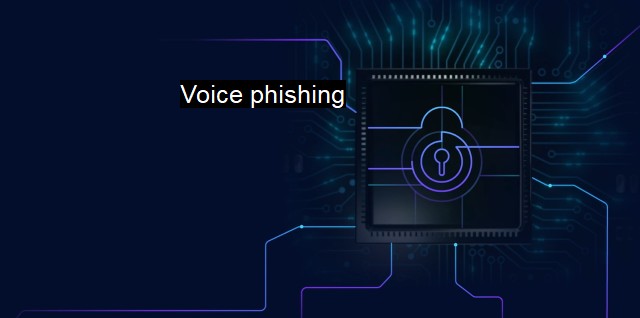What is Voice phishing?
Exploring the Dangers and Detection of Voice Phishing: Understanding The Social Engineering Tactics of Vishing Techniques and Protecting Yourself from Identity Theft
Voice phishing, commonly known as vishing, is a fraudulent activity where attackers masquerade as legitimate entities to deceive individuals into providing private information over the telephone. These can include personal details such as their social security number, credit card details, and PIN numbers. This subset of phishing tactics employs oral communication delivered through voice tech such as smartphones, VoIP, and landlines.Vishing aligns with the traditional phishing method which has notoriously produced harmful ramifications. While conventional phishing methods involved hackers attacking via emails composed with the motive of tricking respondents into clicking malicious links or attachments, voice phishing involves the same principle, practiced via phone. It is a social engineering method designed to manipulate and lure victims into sharing valuable personal and financial information.
Vishing typically springs into action when an attacker impersonating a trusted source, like major retailers, government entities, or financial institutions, contacts a victim over the phone. There's a sense of urgency asserted, with perpetrators asserting dire scenarios such as a compromised bank account, pending law-suits or rewards to prompt immediate action. Provoking immediate reactions is a strategic maneuver, meant to instil panic and evade rational analysis by the victim.
Since phone calls centred on urgent problems need immediate solutions, victims could unintentionally share private information without enough validation. The interaction becomes more convincing as attackers increasingly use voice changing tech and caller ID spoofing to bolster their credibility. In hindsight, a victim who complies essentially hands over his information to cybercriminals unknowingly, paving the way for identity theft, unauthorized transactions or even direct money withdrawal.
In the cybersecurity realm, awareness is a critical inoculation against scams such as vishing. Being cautious regarding unsolicited calls, resisting impulsive actions triggered by alarming scenarios and validating the caller's identity independently are a few ties that can foil the vishing attacks. For instance, if an alleged bank official requests personal confirmation, it would be wise not to comply but to hang up and call the bank directly via an official contact number.
In addition to these preventative measures, effective cyber or specifically anti-vishing software, a form of antivirus for phone security, also plays a vital role in mitigating vishing attacks. When integrated with home or business phone systems, these anti-vishing software significantly reduce the vulnerability to phone scams. They flag or block known fraudulent calling sequences and warn against potential vishing attempts.
Nonetheless, vishing requires concerted efforts combining individual vigilance, robust antivirus solutions (encompassing both computer and phone based), and the adoption of strict security protocols in organizations to protect sensitive information. Phishers are getting more artful, but users remain the first line of defense against these opportunistic scams.
As technology progresses, vishing and scamming techniques will inevitably evolve in sophistication. The increased utilization of AI-enabled voice technologies potentially exacerbates this cybersecurity concern; deepfake voice phishing is the emergent threat whereby cyber attackers use AI to emulate the voices of trusted individuals or organizations.
Balancing the benefits of rapidly evolving technology with its potential misuses and resultant harms is an ongoing challenge. Amid this backdrop, understanding phenomena such as vishing, implementing antivirus solutions, practising cybersecurity hygiene, and investing in awareness initiatives is integral in forging a secure digital landscape. effective global collaborations among governments, sectors, and industries to develop sound cybersecurity strategies can profoundly curb this rising menace.

Voice phishing FAQs
What is voice phishing?
Voice phishing, also known as vishing, is a type of phishing attack that involves tricking people into sharing sensitive information over the phone or a voice message.How does voice phishing work?
Voice phishing typically starts with a phone call or voicemail message that appears to be from a legitimate source, such as a bank, credit card company or tech support team. The attacker may use social engineering tactics to convince the victim to disclose their sensitive information, such as account passwords or credit card numbers.What can I do to protect myself from voice phishing attacks?
To protect yourself from voice phishing, you should be cautious about sharing your personal information over the phone or a voice message. You should also verify the legitimacy of the caller or message sender by independently verifying their identity or contacting the company directly. Additionally, you can use anti-virus software and routinely update your operating system to prevent attackers from installing malware on your devices.What should I do if I suspect that I have fallen victim to a voice phishing attack?
If you think you have been victimized by a voice phishing attack, you should immediately contact the affected financial institution or company to report the incident and take appropriate action to secure your accounts. You should also consider reporting the incident to law enforcement and monitor your bank and credit card statements closely for any suspicious activity.| | A | | | B | | | C | | | D | | | E | | | F | | | G | | | H | | | I | | | J | | | K | | | L | | | M | |
| | N | | | O | | | P | | | Q | | | R | | | S | | | T | | | U | | | V | | | W | | | X | | | Y | | | Z | |
| | 1 | | | 2 | | | 3 | | | 4 | | | 7 | | | 8 | | |||||||